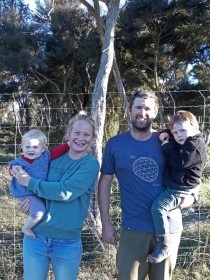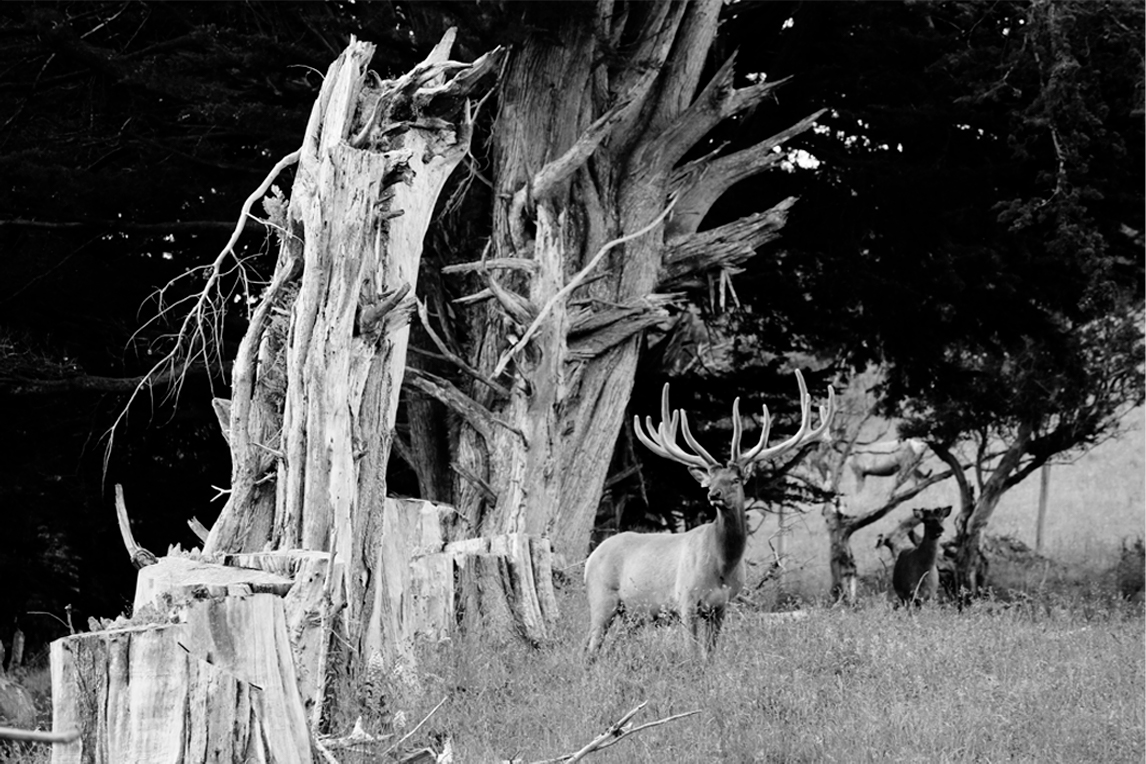The Environmental Awards are convened every second year and are part of the industry’s commitment to environmentally sustainable farmed deer production.
The awards’ primary goals are:
- To promote the adoption of sustainable deer farming practices on all deer farms.
- To recognise innovative deer farmers for implementing and practising sustainable and profitable deer farming practices in land and deer systems management
- To encourage sharing of experiences and proven best sustainable management practices and innovation through the resource of the NZ Deer Farmer's Landcare Manual
Entrants to the awards are assessed based on their environmental performance, based on the principles detailed in The Deer Industry Environmental Management Code of Practice: 2018 and the NZ Deer Farmer's Landcare Manual published by DINZ and the NZ Deer Farmers Association (first published in 2004).
The DINZ-funded Elworthy Premier Award has a value of ~$3000 and comes with a commemorative plaque and a native tree. It is formally presented at the annual Deer Industry Conference. In addition, there is a wide range of merit awards.
The awards were launched in 2001 at the initiative of one of the industry's founding fathers, the late Sir Peter Elworthy and his wife Fiona, Lady Elworthy. The Elworthy Premier Award recognises the importance of the industry’s environmental reputation and the responsibility of farmers to maintain and build that reputation. The promotion of the awards has played an important part in encouraging deer farmers to adopt sustainable farming systems and has highlighted the successes of innovative commercial farmers in overcoming the challenges involved.
The next competition will be held in 2027
It is very easy to enter, as there are virtually no formal entry requirements and a few special conditions, allowing almost all New Zealand deer farmers to enter.
When entries are open, please complete the entry form and we will contact you for more details about the farm and to set up a convenient time for the judging round.
Judging is informal – based on a simple farm tour and related discussions. Typically, the visit will conclude with a Q & A session around the farm table following the tour in which you can present the important areas of environmental risk management and special features of your farming operation, plantings, water quality enhancement and the other issues that you think are important. Judges will also be interested to hear your industry views and review any projects and your innovation on farm.
Apart from the Premier Elworthy Award, there are also other merit award categories across an array of topics. All entrants have a good chance of success in a number of areas.
For more information, call Deer Industry New Zealand on 04 473 4500 or email info@deernz.org
Thank you for your interest in becoming a Deer Industry Environment Awards sponsor.
The awards’ entrants are assessed based on their demonstration of the principles found in this industry’s major information resource on environmental matters: New Zealand Deer Farmer's Landcare Manual.
A wide range of Merit Awards are available to interested sponsors, in addition to the DINZ funded Premier Award with a value of ~$3000, a commemorative plaque and native tree, and formal presentation at the industry conference.
The Elworthy Premier Award recognises the importance of the industry’s environmental image and responsibility. Its promotion and awareness since then has been critical in encouraging deer farmers to adopt sustainable farming systems and raise awareness of the challenges and innovation.
The Merit Award prizes recognise excellence on farm in key areas like, long term planning, community engagement, riparian management, market connectedness, unique soil and land conservation programmes and have a relationship with sponsoring organisations focus and the organisations’ key values.
Each awards prize will be valued at $500 each. This will include an award certificate with the sponsors’ logo. Sponsors are also invited to provide expertise for on-farm assessment and involvement in the judging programme if they wish.
The Deer Farmers’ Environmental Awards also produce a comprehensive brochure for distribution to all deer farmers, industry sectors and environmental agencies and groups in the wider agricultural sector via our industry newsletters the month after conference. The brochure features each entrant’s farm, the outcome of the judges’ comments and sponsors’ logos.
The prize winners are announced during the industry’s annual conference, at the traditional Awards Dinner on the last night of the conference with sponsor recognition, but only the Premier Award is presented then. The Award’s greater value is associated with the New Zealand Deer Farmers’ Association and Deer Industry New Zealand’s hosted public field days on the Premier and Merit Awards’ winning properties where the recognition of the farm and its achievements are highlighted and the Merit Awards’ sponsors have a profile, speaking opportunity and make the presentation of the award on farm.
To register your interest as an awards sponsor or to find out more about the competition, please contact DINZ on 04 473 4500 or info@deernz.org
To view the 2025 Environment Brochure, click here >>
Premier Award (The Elworthy Environmental award) – Sponsored by Deer Industry New Zealand and MPI
Is the vision of a sustainable farming system ensuring long term protection of the environment and sustainable production. Best farming practice is critically evident.
David and Jan Morgan and family | Raincliff Station, South Canterbury
Duncan New Zealand Ltd Award – For vision and innovation whilst mastering a demanding environment.
The recipient of this award demonstrates forward thinking, and innovative farming practises whilst having to operate their business within a demanding environment.
Jane and Charles Rau | Matawai Deer Park Ltd, Gisborne
Gallagher Technology and Innovation Award – For excellent utilisation of farming technologies to improve on farm productivity and manage resources.
The recipient of this award has utilised farming technologies to progress their business, improve on-farm productivity and manage resources.
Rebecca Davidson | Deer Milking NZ/Peel Forest Estate, South Canterbury
NZDFA Next Generation Award – For outstanding performance across environmental, financial and social aspects of the business.
The recipient of this award has demonstrated outstanding performance across environmental, financial and social aspects of their business. Their passion for farming deer and doing it well showcases the opportunities that lie within the NZ deer industry.
Dwight Adlam | Mangahao Deer Company, Shannon
NZ Landcare Trust Award – For excellence in sustainable deer farming through actions on the ground.
The recipient of this award has demonstrated a strong level of leadership through identification of risk areas on their property, implementation of mitigation tools and adoption of farming systems to ensure long term sustainability.
Kim and Judith Rowe | Brookfields, Nelson
The Streamlands Export Ltd Award – For leading, environmentally sustainable velvet farming
The recipient demonstrates wide-ranging environmental awareness and is actively minimising any environmental impacts while producing high quality velvet antler.
David and Jan Morgan and family | Raincliff Station, South Canterbury
To view the 2023 Environment Brochure, click here >>
Premier Award (The Elworthy Environmental award) – Sponsored by Deer Industry New Zealand and MPI
Is the vision of a sustainable farming system ensuring long term protection of the environment and sustainable production. Best farming practice is critically evident.
Richard and Sarah Burdon | Glen Dene, Otago
Duncan New Zealand Ltd Award – For vision and innovation whilst mastering a demanding environment.
The recipient of this award demonstrates forward thinking, and innovative farming practises whilst having to operate their business within a demanding environment.
Scott Hassall | Iffley, North Canterbury
Firstlight Foods Ltd Award – For total commitment to farming sustainably with a strong customer focus.
The recipient demonstrates a passion for the land and strong environmental stewardship. They actively work towards ensuring the land is left for the next generation in a better state than when they started. It is clear from their business decisions that they have the end customer in mind.
Richard and Sarah Burdon | Glen Dene, Otago
Gallagher Technology and Innovation Award – For excellent utilisation of farming technologies to improve on farm productivity and manage resources.
The recipient of this award has utilised farming technologies to progress their business, improve on-farm productivity and manage resources.
Simone Hoskin | Five Hawkes, Manawatu
NZDFA Next Generation Award – For outstanding performance across environmental, financial and social aspects of the business.
The recipient of this award has demonstrated outstanding performance across environmental, financial and social aspects of their business. Their passion for farming deer and doing it well showcases the opportunities that lie within the NZ deer industry.
Mike Humphrey | Green Hill, Manawatu
NZ Landcare Trust Award – For excellence in sustainable deer farming through actions on the ground.
The recipient of this award has demonstrated a strong level of leadership through identification of risk areas on their property, implementation of mitigation tools and adoption of farming systems to ensure long term sustainability.
Lyal Cullen and Marion Neill | Springdale, South Canterbury
The Streamlands Export Ltd Award – For leading, environmentally sustainable velvet farming
The recipient demonstrates wide-ranging environmental awareness and is actively minimising any environmental impacts while producing high quality velvet antler.
Ross and Monique Moore | The Abarta Company Ltd, Waikato
To view the 2019 Environment Brochure, click here >>
Premier Award – The Elworthy Environmental Award - Sponsored by Deer Industry New Zealand and Dr. Gyong Jai Lee
Is the vision of a sustainable farming system ensuring long term protection of the environment and sustainable production. Best farming practice is critically evident.
Grant and Sally Charteris, Forest Road Farm, Hawke’s Bay
Duncan & Company Award - For vision and innovation whilst mastering a demanding environment.
The recipient of this award demonstrates forward thinking and adopts sustainable farming practices whilst having to operate their business within a demanding environment.
John and Mel Somerville, Arawata Deer Farm, Southland
Firstlight Foods Ltd Award - For total commitment to farming sustainably with a strong customer focus.
The recipient demonstrates a passion for the land and strong environmental stewardship. They actively work towards ensuring the land is left for the next generation in a better state than when they started. It is clear from their business decisions that they have the end customer in mind.
Goudies Station, Pamu, Bay of Plenty, Tim Bowron, Manager & Chris Smith, Deer Manager
Gallagher Technology and Innovation Award - For excellent utilisation of farming technologies to improve on farm productivity and manage resources.
The recipient of this award has utilised farming technologies and knowledge to progress their business, improve on farm productivity and manage resources.
William & Karen Oliver, Three Rivers, King Country, Mike Ferrier, Manager
NZ Landcare Trust Award - For excellence in sustainable deer farming through action on the ground.
The recipient of this award has demonstrated a strong level of leadership through identification of risk areas on their property, implementation of mitigation tools and adoption of farming systems to ensure long term sustainability.
Andrew and Pam Peters, Balquhidder, Taihape
NZDFA Next Generation Award - For outstanding performance across environmental, financial and social aspects of the business.
The recipient of this award has demonstrated outstanding performance across environmental, financial and social aspects of their business. Their passion for farming deer and doing it well showcases the opportunities that lie within the NZ deer industry.
Sophie and Heather Atkinson, Atkinson Family Trust, Wharerata Farm, Wairarapa
To view the 2019 Environment Brochure, click here >>
Premier Award – The Elworthy Environmental Award. Sponsored by Deer Industry New Zealand
Evan and Linda Potter, Waipapa Station, Hawke’s Bay

“The vision of a sustainable farming system, ensuring long-term protection of the environment and sustainable production. Best farming practice is clearly evident.”
What impressed the judges
The Potters’ vision for the property 20 years ago and the work done since by starting the fencing at the back of the property impressed the judges. They have utilised the 1999 Soil Conservation Plan andalso a Land Use Capability Soil map developed in 2005. These have helped with development and also helped build a thorough knowledge of soils on the property, resulting in an excellent fit of stock to land class. In addition, the judges praised:
- Excellent long-term protection of the Hawea Stream and the smaller streams that run into it, and a huge commitment to fencing it and other areas with biodiversity values.
- Continued fencing of smaller areas, which aids stock flow and allows further planting.
- Use of willows and poplars to help prevent soil erosion, areas planted in Radiata pine and extensive areas of native bush provide shade and shelter and help make Waipapa Station a very attractive property.
- Carefully planned nutrient management – identifying areas that will not provide a productive return saves money, protects natural capital, and allows identification of alternative uses.
- Identification of critical source areas and ways to strategically graze.
- A good relationship with Hawke’s Bay Regional Council. This has continued to the stage where the council brings other councils to see the work done.
- Practical support from the QEII National Trust has helped with funding and long-term protection of significant areas of biodiversity as well as sharing knowledge and help with long-term pest control.
- Seed collection, and growing of trees for replanting back into protected areas.
- Involvement in local deer industry initiatives such as the Advance Party provides an avenue to share achievements and methods with other deer famers.
- A strong commitment to the local community, e.g. instigating the Possum Control Area, involvement in the school Board of Trustees and hockey coaching.
Judges’ suggestions for further improvement
- Identify ways of documenting (e.g. with photographs) good management practices, particularly seasonal activities like winter grazing.
- Further work with regional council staff to show value gained from soil conservation and land use capability plans, and ways these can be encapsulated in new FEMP framework.
- Work with nutrient adviser on content of nutrient management plan and alignment with Overseer.
- Periodic (e.g. 6-monthly) photographic records to show progress with regeneration and monitor change over time; this is also useful for monitoring weeds such as old man’s beard.
- Involve local schools in projects such as replanting or monitoring stream health; this is also an opportunity to teach students about deer farming.
- Explore potential for farm tourism venture based on the QEII covenanted stream and gorge areas.
NZ Landcare Trust Award

Evan and Linda Potter, Waipapa Station, Hawke’s Bay
For Excellence in sustainable deer farming through action on the ground.
The recipient of this award has demonstrated a strong level of leadership through identification of risk areas on their property, implementation of mitigation tools and adoption of farming systems to ensure long term sustainability.
Duncan & Company Award

John and Mary Falconer, Clachanburn, Central Otago
For vision and innovation whilst mastering a demanding environment.
Gallagher Technology and Innovation Award

John and Mary Falconer, Clachanburn, Central Otago
For excellent utilisation of farming technologies to improve on farm productivity and manage resources.
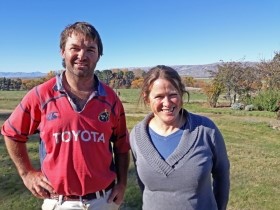
What impressed the judges
The Falconers have an impressive mix of deer-based business streams via trophy hunting, stud breeding and selling, semen selling, venison and velvet production. They share a passion for the animals and a strong sense of entrepreneurship.
In particular, the judges were impressed by:
- The array of technology used across the business and the Falconers’ anticipation of future challenges.
- Excellent match of stock class to land use and management of extensive hill country without needing to bring in outside supplements.
- Protection of natural cover, soils and water quality.
- Extensive pest control work, helping protect biodiversity and the business.
- Efforts to manage water quality and quantity in a low-rainfall environment. (John Falconer is a director of the Maniototo Irrigation Company, working with the community and stakeholders to build shared understanding of issues.) Clachanburn’s own water storage system with use of low-rate irrigation provides certainty and security; monitoring is done to check whether limits in the Otago Water Plan are being met.
- Steps taken to protect the galaxiids in the upper reaches of streams.
Judges’ suggestions for further improvement
- Having the Advance Party they belong to work as an Environment Group to help all members produce a Farm Environment Plan.
- Consider FarmIQ to help with recording and documentation, especially with the different business streams. It may also help with biosecurity issues of bringing in outside stock, provide an option for an FEP, and keep essential information safe.
- Get advisers together yearly to work as a team.
- Look at regular water monitoring where it enters and exits the property, e.g. four times a year would pick up seasonal differences, particularly in spring (coming out of winter conditions) and summer when a lot of the Otago Water Plan limits apply.
- Stream health assessments: these only cost time, but complement the N, P, and E. coli tests.
- Engage an ecologist or botanist to compile a plant list on the hill block to help identify any threatened species and advise on how best to protect them.
- Develop a plan for the wetland/riparian area where the stream exits the property, including riparian plants to shade the stream and dryland plants to add appeal to the garden of significance.
FirstLight Foods Ltd Award
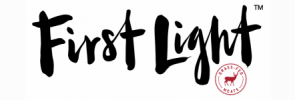
Adam and Sharon Waite, Northbank Station, Canterbury
For total commitment to farming sustainably with a strong customer focus.
NZDFA Next Generation Award
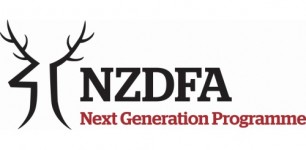
Adam and Sharon Waite, Northbank Station, Canterbury
For outstanding performance across environmental, financial and social aspects of the business.
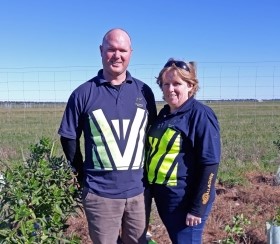
What impressed the judges
The Waites’ planning of the re-development of the property is bringing benefits to the livestock and farm business and, eventually, the farm environment. Planned changes include improved irrigation, pasture covers and planting of new native shelterbelts. New fruit trees and ornamentals will beautify the property and provide shade. The judges were also impressed by:
- Extensive documentation, right through to induction sheets for horse riders. FarmIQ has helped with recording, documentation and biosecurity with the frequent animal movement.
- Involvement of the local community, including sourcing trees locally, a local beekeeper, local contractors and identifying the need for firewood for workers at Mountain River Venison Northbank Station’s owner).
- The land is well suited to deer finishing.
- Good management of the intricate relationship with Mountain River Venison, which can provide benefits but also challenges with scheduling of stock alongside cropping and feed management considerations.
Judges’ suggestions for further improvement
- Work with adviser on nutrient budget and look carefully at figures for the new development, particularly that they don’t blow out above the baseline, especially with the requirements for the Selwyn Zone. The increase in livestock weights may also affect contaminant loss. Use Overseer FM to check some of this.
- Establish photo points across the property before the existing trees are removed to provide a record of the changes. This will be important for the new shelterbelts to monitor growth and changes, and for auditing.
- Removal of taller trees could make it harder to supply shade for deer in hot summers. Improvement in pasture could increase wallowing to counter the heat. Consider fast-growing species in the mix that tolerate topping or pivot irrigators.
- Consider an irrigation manager’s course, to get the best out of the new system.
- Another deer shed on the east block would mean less travel for deer, easier weighing and velvetting and less labour.
- Schedule some off-farm time to stay fresh.
Highly Commended
Kiri Rupert and Josh Brook, Leamington and Scotland Farms, South Canterbury
For excellence in business planning, farm environment planning and farm succession
What impressed the judges
In making their Highly Commended recommendation, the judges complimented Kiri and Josh for having achieved a lot of their objectives in the short amount of time they have been managing the properties.
In particular they liked:
- An excellent document that included a Farm Environment Plan. This outlined business objectives and strategies for managing risks.
- Regular updating and inclusion of photopoints to monitor progress.
- Dedication to care of a QEII covenant and significant natural areas and connection to the Orari River Protection Group.
- Interest in raising trees from collected seed
- Planting being done in fenced-off areas to provide screening, shade and added biodiversity.
- Plans for purchasing another block of land suitable for hind fawning.
- Impressive pasture on Leamington, with a good mix of species providing excellent covers going into winter.
- Good farm succession planning, definition of roles and teamwork.
- Fencing of all waterways with planting plans to benefit biodiversity, water quality, livestock and aesthetic values.
- Efforts to reduce nutrient loss rates and find ways to protect soil.
The judges suggested that Josh and Kiri consider the following actions:
- Running different scenarios through Overseer FM to see what will reduce nutrient loss rates.
- Given the excellent grass covers and composition, consider whether it is necessary or sustainable (cost and environmentally) to feed extra silage and PKE at current rates.
- Investigate whether bats are visiting covenant and native areas (more assistance may be available to help restore these areas if they are found there).
- Engage with the Orari River Protection Group and share what they are doing with the local community.
- Consider allocation of tasks and employing more staff if another property is purchased.
Other entrants
Alf and Phyllis, and Bryce and Sophia Kinzett, Murchison
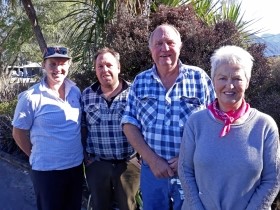
What impressed the judges
Award judges visiting the Kinzetts acknowledged the many years of hard work and careful management evident across the property.
In particular they noted:
- Fencing and shelterbelts providing shade and shelter suitable for different seasons and screening different stock classes to reducing fence pacing.
- Protecting existing trees using corrugated iron.
- Providing excellent feed and careful selection of genetics, contributing to a lift in velvet weights.
- Farm succession, acknowledging skills and common goals of all involved, with addition of new areas of adjacent land allowing further development, challenges and opportunities.
- Maintaining good condition of hinds and fawns despite a challenging drought.
- Use of matting in outside pens at the deer yards, and development of laneways along the long narrow property.
- The plans for developing new hill blocks to balance the flats and give scope for hind breeding.
- Sending R2 stags away for winter grazing, benefitting stock and pasture management.
- Fencing and planting ephemeral seepage areas and creation of sediment traps.
The judges suggested that the Kinzetts consider the following actions:
- Documenting good management practices through a Farm Environment Plan (FEP), using FEP workshops and the Environmental Management Code of Practice as a reference.
- Obtaining a farm map that also covers newly purchased areas.
- Permanent fencing or hot wires for seepage areas in crop paddocks (rather than temporary fencing), plant wetland species to help filter runoff and use more small sediment traps.
- Consider other options to avoid stock crossings over the busy road that bisects the property.
- Document through photographs the logging work above the property, work done in culverts and stream protection as it enters the property.
- Document changes and growth over time, and photograph winter grazing management.
- Explore opportunities to involve tourists in planting and sediment trap work to share the farm story of work to protect biodiversity and water quality.
- Investigate getting carbon credits or explore options for a tourist walk in native forest.
- Get Bryce and Sophia (the younger generation) off farm regularly to share what they are doing, learn from others, or upskill, e.g. through the DFA Next Generation programme.
Deer Farmers’ Environmental Awards 2019 Judging panel
Janet Gregory (Lead Judge)
Regional Coordinator (Canterbury) NZ Landcare Trust
Lindsay Fung
Environmental Stewardship Manager, Deer Industry New Zealand
Phil McKenzie
Deer Industry Environment Group Coordinator, Deer Industry New Zealand.
Steve Borland
Co-owner of velvet breeding and growing business, Shabor, at Oparau, Waikato and winner of the 2017 Deer Farmers’ Premier Elworthy Environmental Award.
Further information
The Deer Industry Environmental Management Code of Practice 2018 is a comprehensive guide to good management practices at farm level. The code is available free to all deer farmers as a ring-bound publication. To request a copy, email info@deernz.org or calling the Deer Industry New Zealand office on 04 473 4500. Alternatively the code can be downloaded from the DINZ website. Other general resources, e.g. on climate change, are also available on the DINZ website.
Several Deer Fact information sheets focus on the environment, including titles on:
- Fence pacing
- Farm environment plans
- Protecting waterways from wallow and feed pad runoff
- Nutrient management on deer farms.
These can be downloaded here >>
For further information on the Deer Industry Environmental Awards contact DINZ on 04 473 4500 or info@deernz.org
To view the 2017 Environment Brochure, click here >>
Premier Award – The Elworthy Environmental Award - Sponsored by Deer Industry New Zealand
Is the vision of a sustainable farming system ensuring long term protection of the environment and sustainable production. Best farming practice is critically evident.
Steve, Judy & Chris Borland and Bob Sharp
Duncan & Company Award - For vision and innovation whilst mastering a demanding environment.
The recipient of this award demonstrates forward thinking and adopts sustainable farming practices whilst having to operate their business within a demanding environment.
Lyndon & Millie Matthews and Family (Use of internet to promote farm and NZ farm story – contact with Swiss group. Three years of drought. Major wetland retirement and restoration has encouraged neighbour)
FirstLight Foods Ltd Award - For total commitment to farming sustainably with a strong customer focus.
The recipient demonstrates a passion for the land and strong environmental stewardship. They actively work towards ensuring the land is left for the next generation in a better state than when they started. It is clear from their business decisions that they have the end customer in mind.
Claire Parkes & Simon Vincent (Deer farming since 1980 with environmental management a core focus from the start. 1996 purchased their first large-scale farm – all environmental work carried out by themselves. A clear vision of what is required and an ongoing programme of activity is in place. Minimal bought in feed (local apple pomice). Strong linkage with international consumers through SFF Venison Global Retail Programme.)
Gallagher Technology and Innovation Award - For excellent utilisation of farming technologies to improve on farm productivity and manage resources.
The recipient of this award has utilised farming technologies and knowledge to progress their business, improve on farm productivity and manage resources.
David & Hilary Ward (Intensive land use that is managed sustainably with careful and scrupulous monitoring of inputs and management. The most fantastic soil resource in Canterbury. Open to new ideas and provides a teaching resource to local and international university students.)
NZ Landcare Trust Award - For Excellence in sustainable deer farming through action on the ground.
The recipient of this award has demonstrated a strong level of leadership through identification of risk areas on their property, implementation of mitigation tools and adoption of farming systems to ensure long term sustainability.
Steve & Chris Borland and Bob Sharp (Take a steep, erodible farm with no deer fencing, high rainfall, lots of waterways and many patches of native bush. Add deer, make a profit and have a low environmental footprint… discuss. Solution: Lots of hard work, prioritised areas for focus, seek council assistance, engage the community, do a job properly but seek low cost options where possible… and have a plan!)
NZDFA Next Generation Award - For outstanding performance across environmental, financial and social aspects of the business.
The recipient of this award has demonstrated outstanding performance across environmental, financial and social aspects of their business. Their passion for farming deer and doing it well showcases the opportunities that lie within the NZ deer industry.
Hamish & Julia Mackenzie (A well run and low footprint farm operating in an extremely challenging physical environment with significant social scrutiny and regulation. In depth understanding of the environmental challenges and opportunities of the farm. Tourism is seen as an integral part of the business. Strong, resolute leadership for the farming community with the conviction of fairness and “doing the right thing”.)
To view the 2014 Environment Brochure, click here >>
Premier Award - The Elworthy Environmental Award-Sponsored by Deer Industry New Zealand
Is the vision of a sustainable farming system. Ensuring long term protection of the environment and sustainable production. Best farming practise is clearly evident.
George Williams and Laura Billings – Te Maire, Hawkes Bay
NZ Landcare Trust Award - For Excellence in sustainable deer farming through action on the groundThe recipient of this award has demonstrated a strong level of leadership through identification of risk areas on their property, implementation of mitigation tools and adoption of farming systems to ensure long term sustainability
Landcorp Eweburn Farm, Te Anau, Ray Tibbles (Manager)
Duncan & Company Award - For vision and innovation whilst mastering a demanding environment.
The recipient of this award demonstrates forward thinking, and innovative farming practises whilst having to operate their business within a demanding environment.
George Williams and Laura Billings – Te Maire, Hawkes Bay
FirstLight Foods Ltd Award - For total commitment to farming sustainably with a strong customer focus.
The recipient demonstrates a passion for the land and strong environmental stewardship. They actively work towards ensuring the land is left for the next generation in a better state than when they started. It is clear from their business decisions that they have the end customer in mind.
Hamish and Anna Orbell, Clayton Station, Fairlie
NZDFA Next Generation Award – For outstanding performance across environmental, financial and social aspects of the business
The recipient of this award has demonstrated outstanding performance across environmental, financial and social aspects of their business. Their passion for farming deer and doing it so well showcases the opportunities that lie within the NZ deer industry.
George Williams and Laura Billings – Te Maire, Hawkes Bay
Gallagher Technology and Innovation Award – For excellent utilisation of farming technologies to improve on farm productivity and manage resources
The recipient of this award has utilised farming technologies to progress their business, improve on-farm productivity and manage resources.
Murray and Beverly Hagen, Manapouri, Jim Cameron (Manager)
2012 Deer Industry Environment Award Winners
To view the 2012 Environment Brochure, click here >>
Brian & Jacqui Wellington, Te Awamutu Station
Premier Elworthy Award, NZ Landcare Trust Award & the Fish & Game Award
Robert & Alex Peacock, Orari Station, SCNO
QEII National Trust Award for demostrating outstanding stewardship
Willie & Michele Coates, Haupiri Farm, West Coast
Duncan & Co Award for innovation in a challenging environment
Lyndon & Millie Matthews, Puketira Deer, Canterbury
Firstlight Foods Ltd for total commitment to farming sustainably with a customer focus
2010 Deer Industry Environment Award Winners
To view the 2010 Environment Brochure, click here >>
Tim and Trish Smith, Landcorp Farming, Mararoa Station
Premier Elworthy Award, NZ Landcare Trust Award and Duncan & Co Award
Graham Carr, Peel Forest Estate
Firstlight Award (Total sustainability)
Shelley Trotter & Tony Ward, Solway Deer Farm
Fish & Game (for excellence in riparian management)
Tim Aitken & Lucy Robertshawe, The Steyning
NZDFA (Environmental and Sustainability award)
2008 Deer Industry Environment Award Winners
To view the 2008 Environment Brochure, click here >>
Grant and Andrea Cochrane, Otago
Premier Elworthy Award, Landcare Trust Award and Fish and Game NZ Award
Lyndon and Millie Matthews, North Canterbury
Duncan & Co Award (Innovation)
Mike and Chris Stephens, South Otago
Firstlight Award (Total sustainability)
2006: Murray Neutz and Keith Nattrass, Geraldine
To view the 2006 Environment Brochure, click here >>
2004: George and Mary Scott, Southland
To view the 2004 Environment Brochure, click here >>
2003: Wayne and Tricia Aspin, Manukau
To view the 2003 Environment Brochure, click here >>
2002: Brian and Brigitte Richards, Kaipara
To view the 2002 Environment Brochure, click here >>
2001: Victor and Margaret Clark, Reporoa
To view the 2001 Environment Brochure, click here >>

